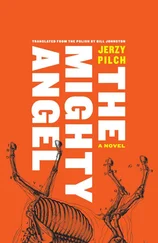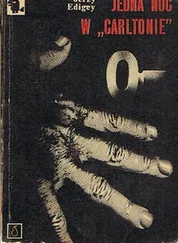Granted, it was he who, one fine day, drew an ideal line in the air, connecting the top of the tower to the window in question; granted, it was he who forced me to climb that Mount Everest and pointed out the distant rectangle, entirely dark in the blinding sun; granted, it was under his leadership that we sneaked over to the swimming pool one evening and, trembling in the darkness, which was lit up by the leaden surface of the water, climbed up to the highest platform of our observatory and stared at the yellow light as if at a distant, motionless star; granted, it was he who said at that time: If only we had a telescope, or at least the pair of binoculars ; granted, it was he who, about a week later, dug up from the bottom of the river his treasure of treasures; granted, granted, granted! All of it granted! But now, at the decisive moment, now, at the threshold of the night that was to settle everything; now — under my leadership — we climbed the tower! Now I had slung over my shoulder a set of Carl Zeiss lenses of the highest, prewar quality, which would allow us to see into — and this was no time for modesty — the fundamental mystery of existence.
I was the leader, and I knew that I was the leader, and I knew what sort of leader I wanted to be. Magnanimity — as befitted the greatest leaders of humanity — never left my heart. When we found ourselves at the top, when the delicate, dark blue breeze embraced our heads. And when we had turned our faces toward the yellow light, I took Gustaw Branny’s hunting binoculars off my shoulder, and I passed them to Janek. He, in turn, took them without a word, lifted them to his eyes, and looked for a long time. A long time. A very long time. For an inordinately long time, he scrutinized the unfathomable lighthouse pulsating with yellow splendor. For a long time, he sought out the mysterious lighthouse keeper in brocade dresses who was living there. For a long time. A very long time. For a long time, he stared at the peak of Olympus covered with a yellow cloud, and for a long time, he waited for the figure of the goddess to emerge from the clouds of glory. For a long time. A very long time. An exceptionally long time.
“What, for fuck’s sake? What do you see?” My nerves got the better of me, and I lost the dignity of the leader.
“Nothing.”
“What do you mean, nothing?”
“Well, fucking nothing.”
“What nothing?
“Nothing.”
“You have to see something. Do you see her?”
“I do.”
“So why are you bullshitting me that you’re not seeing anything?”
“I’m not bullshitting. I’m not seeing anything.”
“What do you mean you’re not seeing anything, when you are?”
“I’m not seeing anything.”
“Do you see her?
“I do.”
“So what is she doing?
“Nothing, fuck it, she isn’t doing anything. She’s sitting at a table and writing.”
I couldn’t stand any more tension; my nerves were completely shot. I fell out of not only the role of leader, but out of all roles and all functions. And with some incomprehensible sorrow in my heart; with some sort of desperate grievance toward the world, that it doesn’t have any mysteries; or perhaps with the terrible suspicion that my friend was lying, that he was deceiving me and didn’t want to tell about the unprecedented things that he was seeing — with a sudden and violent motion, I reached for the binoculars. Too suddenly and too violently, a thousand times too suddenly and a thousand times too violently, because not only did I not manage to grasp them, lift them to my eyes; not only did I not manage to catch sight, dumbfounded, of the bizarrely dressed female vacationer sitting at the desk and writing; but I didn’t manage to do anything. I didn’t manage to do anything, because, suddenly, everything was over. Suddenly everything — speaking both metaphorically and literally — came crashing down. With a precise and strong blow — which, if I had really wanted to inflict it, I would never have been able to do with such precision and strength — with an unprecedented, and unintentional, simple boxer’s punch, or perhaps a volleyball player’s spike, I dislodged the binoculars from Janek Nikandy’s hands, and they, like a flighty, nocturnal creature slipping through our fingers, flew to the ground. Unfortunately, this was not the desperate leap of the escapee attempting to regain his freedom, it was not the liberating leap into the water: it was a suicidal leap onto the cement.
I wasn’t certain whether I was hearing the crack of the bursting casing, the crunching of the lenses as they were ground to dust, or Janek’s diabolical snicker. Sometimes, in the famous least appropriate moments , a strange laughter came over him. Once, with precisely that same sort of snicker, he told us that one of his sisters, fourteen-year-old Regina, was pregnant, and that his father would probably kill her; or that May First was no holiday at all, but an invention of the Communists; or that his mother, Mrs. Nikandy, beautiful as a Grecian goddess, goes to the WC at night completely naked — in none of these stories was there anything comic. Nor was there even a hint of consolation over the smashed binoculars lying below the diving platform. I was too innocent and too young for the phrase—“it’s so terrible that it’s funny”; Janek, too — except that he laughed. He didn’t know that it was so tragic that it was funny; but he had already been blessed by the household deity of the Nikandys with the gift of laughter that surpasses consciousness. And tragicomic events now followed with unprecedented speed, and one after another. First, in the glowing yellow window of the Almira there appeared — fear had sharpened our senses, for we could see it even without the binoculars — a dreadfully tall and thin silhouette, and right away thereafter, as if it had God knows what sort of volatility, it began, like a skier schussing in the darkness, to fly in our direction. Before we managed to climb down, on entirely wobbly legs, she was already there, shining a flashlight thin as a pencil, and gathering the glassy gravel, to which the binoculars had been reduced, into a plastic bag.
At first, we thought it wasn’t her, that it was one of the female sprinters, who were at their training camp Start . For the bizarrely dressed female vacationer was not dressed bizarrely at all this time. She wasn’t wearing any brocade dresses with incredible patterns, but a dark green sweatsuit, which made her look a hundred years younger. On her head — no curls, buns, or bouffants, instead her hair was drawn into a pony tail. From time to time, a lively beam of the flashlight illuminated her face, and then it became clear what beautiful, what expressive, and what — I have no better word for it — quick features she was hiding on a daily basis under vulgar make-up.
My God, how miraculous it would have been to have made all these discoveries through the binoculars! To peep at her every evening! To discover, every evening, a different secret — now the secret of the dress, now the secret of the hairdo, now the secret of the make-up! And You, Lord God, knocked the binoculars from my fingers, You commanded the bizarre angel, with make-up rinsed off and her hair combed out for sleep, to fly directly down to us. You commanded us to experience all the epiphanies at once. You commanded us to stare at her from right up close, without the binoculars. And You condemned — me at least — to a life-long mania for distinctively beautiful female loonies that are slightly past thirty!
We stood completely motionless, like a couple of complete dunces. The phantom in the green sweatsuit seemed not to pay us the least attention, and only once she had finished her work, once she had gathered up the smashed lenses, down to the last speck of dust, then she stood up straight and came up to us, and one by one she took first me, then Janek by the chin, and then shined the flashlight, first in our eyes, and then in her own — as if she were performing some sort of shamanist presentation — and she said, Bandits, complete bandits , with some sort of stifled and passionate voice. To this day, I remember that flash of light in her grey pupils, and I remember the intensity of those pupils, and I remember the dark hieroglyphs in their depths, and I am absolutely positive that in those signs were recorded the beginnings of all my amorous prayers.
Читать дальше












